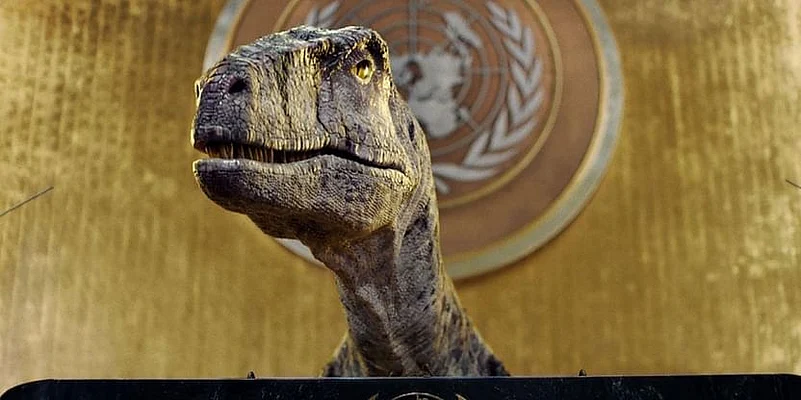When you have a dinosaur walking into a room to have a chat with you, you sit up and listen! That’s the premise of the latest campaign of the United Nations Development Programme (UNDP), as it exhorts the world to act against climate change since it is ‘now or never’.
Titled #DontChooseExtinction, UNDP released the campaign’s first video in which Frankie, the dinosaur, takes things into his hands at a UN meeting of dignitaries to drive home a few things about extinction. “I know a thing or two about extinction,” Frankie says as he takes centrestage at the meeting.
As the 26th UN climate change conference (COP26) begins at Glasgow in Scotland, UK, on October 31, the UNDP has set the tone of urgency with their latest social media outreach. At COP26, delegates from 120 countries will discuss ways to drastically cut carbon emissions and restrict global warming. Yet governments across the world are still spending $420 billion annually on major pollutants such as fossil fuels. Production and use of fossil fuels such as coal, petroleum and natural gas are the major culprits behind accelerating climate change. Man-made climate change is responsible for frequent flash floods, hurricanes, droughts and heatwaves. Besides, pollution from fossil fuels is known to kill around seven million people every year.
The UNDP is clear in its messaging: It was an asteroid that caused the extinction of dinosaurs. What is our excuse? As Frankie asks in the video, why are governments spending billions of dollars of taxpayers’ money on subsidising fossil fuel? Especially when that money could have been used for a better cause, such as ending poverty.
As the world builds back from the ashes of the pandemic, Frankie has a clear message: “This is humanity’s big chance… Don’t choose extinction. Save your species before it’s too late. It’s time for humans to stop making excuses and start making changes.” Frankie ends his heartfelt speech to a standing ovation.
Greenhouse gas emissions have already increased the earth’s temperature by 1.1 degree Celsius since 1850. As the climate change dialogue continues to see divisions between the developed and developing nations, where countries like India have been seeking climate justice through transfer of finance and technology from the West, the question is whether there will be enough reasons for a standing ovation at the end of COP26.
























